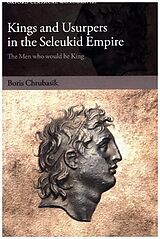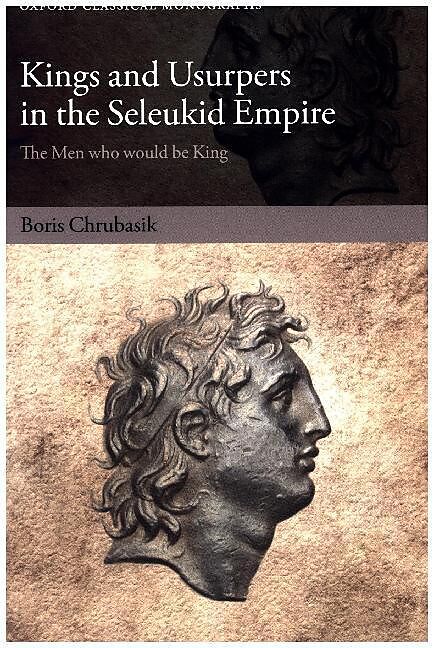Kings and Usurpers in the Seleukid Empire
Einband:
Fester Einband
EAN:
9780198786924
Untertitel:
The Men who would be King
Genre:
Geschichte
Autor:
Boris Chrubasik
Herausgeber:
Oxford Academic
Anzahl Seiten:
336
Erscheinungsdatum:
27.10.2016
ISBN:
978-0-19-878692-4
This volume focuses on ideas of kingship and power in the Seleukid empire, specifically the role of usurpers. Redefining the king as only one of several political players, it advances a political history predicated on social power and argues that despite its strong rulers the empire was structurally weak and the position of its kings precarious.
Zusatztext Much of Chrubasik's argument is quite persuasive ... and heuristically powerful: it certainly raises questions that Seleucid historians must address. Informationen zum Autor Boris Chrubasik is Assistant Professor of Historical Studies and Classics at the University of Toronto. Originally from Germany, he earned his doctorate at the University of Oxford and spent a year at the University of Exeter before moving to Toronto. An ancient historian, he has a particular interest in the history of the eastern Mediterranean from the Achaemenid to the late Hellenistic periods, and has published articles on the relationship between Hellenisticcities and kings and the Attalid state. He is currently in the early steps of a new project on the relationship between ancient empires and local sanctuaries in Ancient Turkey and the Levantine coast. Klappentext This volume focuses on ideas of kingship and power in the Seleukid empire, specifically the role of usurpers. Redefining the king as only one of several political players, it advances a political history predicated on social power and argues that despite its strong rulers the empire was structurally weak and the position of its kings precarious. Zusammenfassung This volume focuses on ideas of kingship and power in the Seleukid empire, specifically the role of usurpers. Redefining the king as only one of several political players, it advances a political history predicated on social power and argues that despite its strong rulers the empire was structurally weak and the position of its kings precarious.
Autorentext
Boris Chrubasik is Assistant Professor of Historical Studies and Classics at the University of Toronto. Originally from Germany, he earned his doctorate at the University of Oxford and spent a year at the University of Exeter before moving to Toronto. An ancient historian, he has a particular interest in the history of the eastern Mediterranean from the Achaemenid to the late Hellenistic periods, and has published articles on the relationship between Hellenistic cities and kings and the Attalid state. He is currently in the early steps of a new project on the relationship between ancient empires and local sanctuaries in Ancient Turkey and the Levantine coast.
Zusammenfassung
Kings and Usurpers in the Seleukid Empire: The Men who would be King focuses on ideas of kingship and power in the Seleukid empire, the largest of the successor states of Alexander the Great. Exploring the question of how a man becomes a king, it specifically examines the role of usurpers in this particular kingdom - those who attempted to become king, and who were labelled as rebels by ancient authors after their demise - by placing these individuals in their appropriate historical contexts through careful analysis of the literary, numismatic, and epigraphic material. By writing about kings and rebels, literary accounts make a clear statement about who had the right to rule and who did not, and the Seleukid kings actively fostered their own images of this right throughout the third and second centuries BCE. However, what emerges from the documentary evidence is a revelatory picture of a political landscape in which kings and those who would be kings were in constant competition to persuade whole cities and armies that they were the only plausible monarch, and of a right to rule that, advanced and refuted on so many sides, simply did not exist. Through careful analysis, this volume advances a new political history of the Seleukid empire that is predicated on social power, redefining the role of the king as only one of several players within the social world and offering new approaches to the interpretation of the relationship between these individuals themselves and with the empire they sought to rule. In doing so, it both questions the current consensus on the Seleukid state, arguing instead that despite its many strong rulers the empire was structurally weak, and offers a new approach to writing political history of the ancient world.
Inhalt
i: Introduction
Prologue: The Death of a King
A History of Kings and Usurpers
Usurpation as an Interpretative Model
1: Central and Local Power in the Seleukid Empire
1.1 Dynasts in all the Land
1.2 The Strength of Local Power
1.3 Between Central and Local Power
1.4 Conclusion
2: Usurpers in Asia Minor: The Third Century
2.1 Late Third-Century Asia Minor and the Loss of Seleukid Control, c. 246-213
2.2 Becoming King in Asia Minor
2.3 Royal Success in Asia Minor: The Limits of the Seleukid Family
3: Usurpers in the Levant and Beyond: The Second Century
3.1 A History of the Seleukid Empire in the Mid-Second Century, c. 162 123
3.2 Images of Kingship: The Royal Offers
3.3 The Reception of Royal Offers: When Audiences Become Agents
3.4 Usurpers in the Second Century: Conclusion
4: Usurpers in the Seleukid Empire
4.1 The Origin of Usurpers
4.2 Royal Reaction: Punishment, Pardon, and Adaptation
5: Kings in the Seleukid Empire: A Story of Usurpation, Monarchy, and Power
5.1 Power and Kingship in the Seleukid Empire
5.2 Kings and Empires: Assessing the Seleukid State
Appendices
A. The Meydancikkale Hoard, and the Recovery of Rough Kilikia under Seleukos II
B. Antiochos Hierax and the city of Magnesia
C. Alexander Balas and the Eagle Coinage
D. Usurpers and the Senate of Rome
Endmatter
Bibliography
i. Primary Material
ii. Secondary Material

Leider konnten wir für diesen Artikel keine Preise ermitteln ...
billigbuch.ch sucht jetzt für Sie die besten Angebote ...
Die aktuellen Verkaufspreise von 6 Onlineshops werden in Realtime abgefragt.
Sie können das gewünschte Produkt anschliessend direkt beim Anbieter Ihrer Wahl bestellen.
Loading...
Die aktuellen Verkaufspreise von 6 Onlineshops werden in Realtime abgefragt.
Sie können das gewünschte Produkt anschliessend direkt beim Anbieter Ihrer Wahl bestellen.
| # | Onlineshop | Preis CHF | Versand CHF | Total CHF | ||
|---|---|---|---|---|---|---|
| 1 | Seller | 0.00 | 0.00 | 0.00 |
